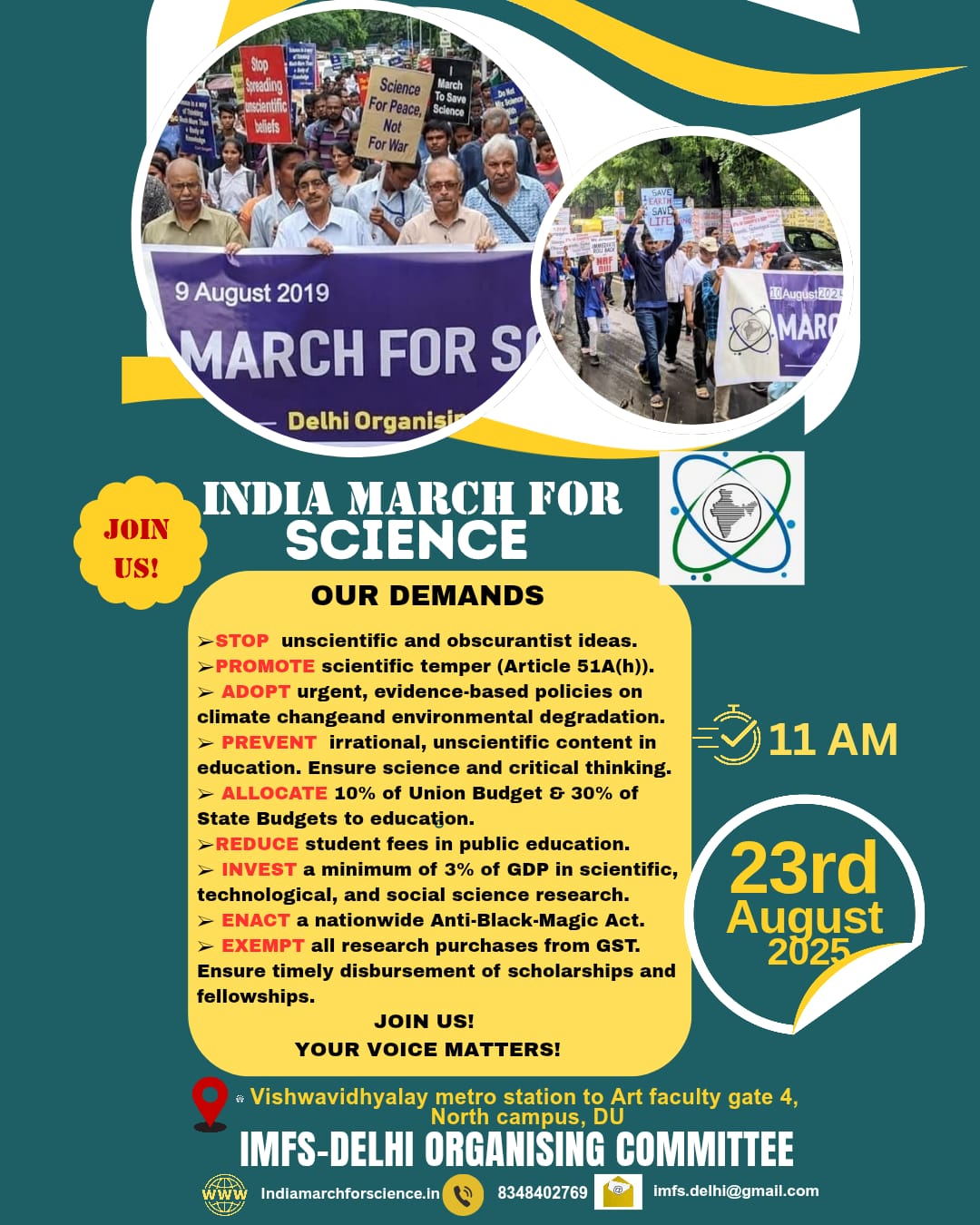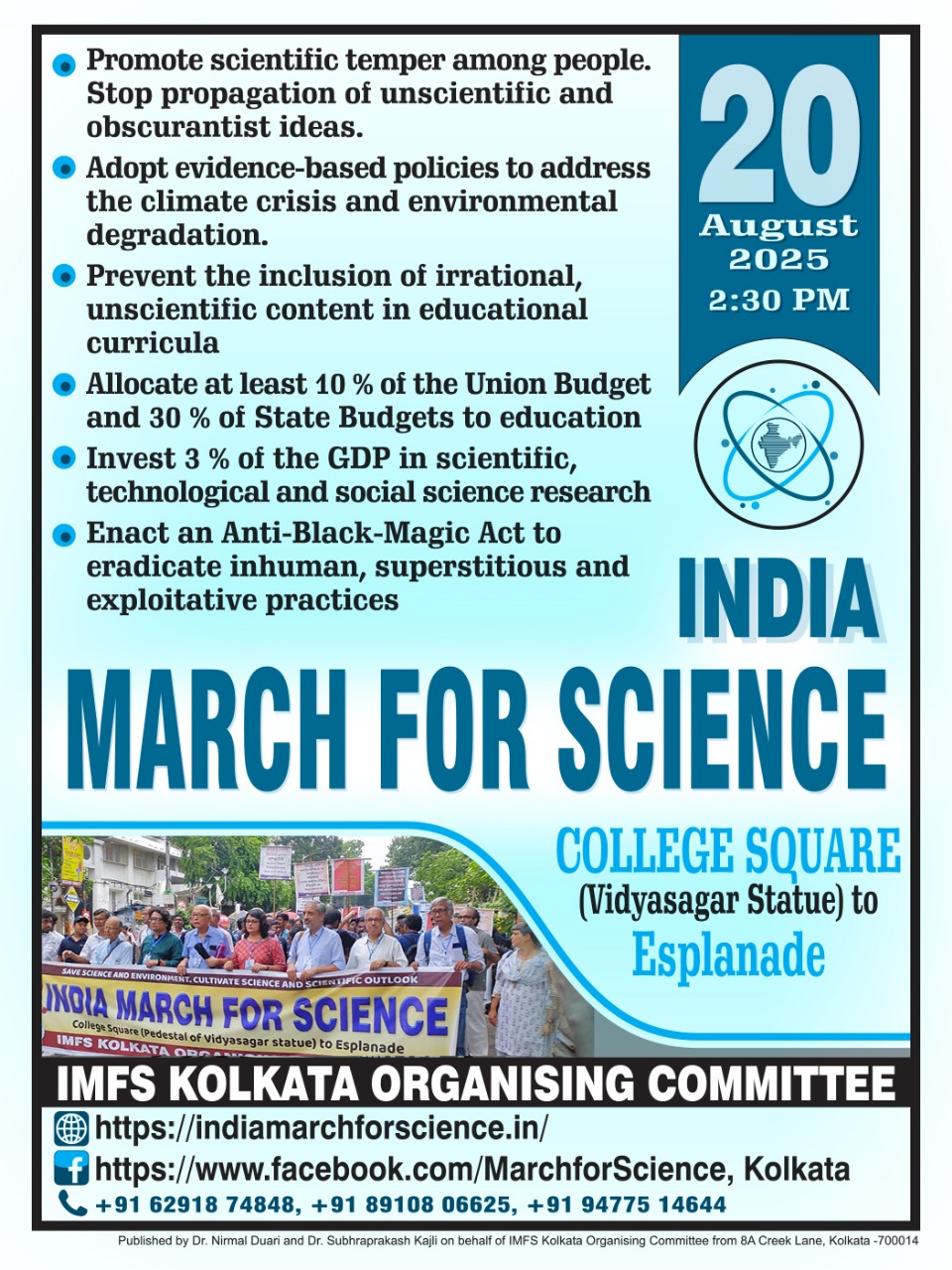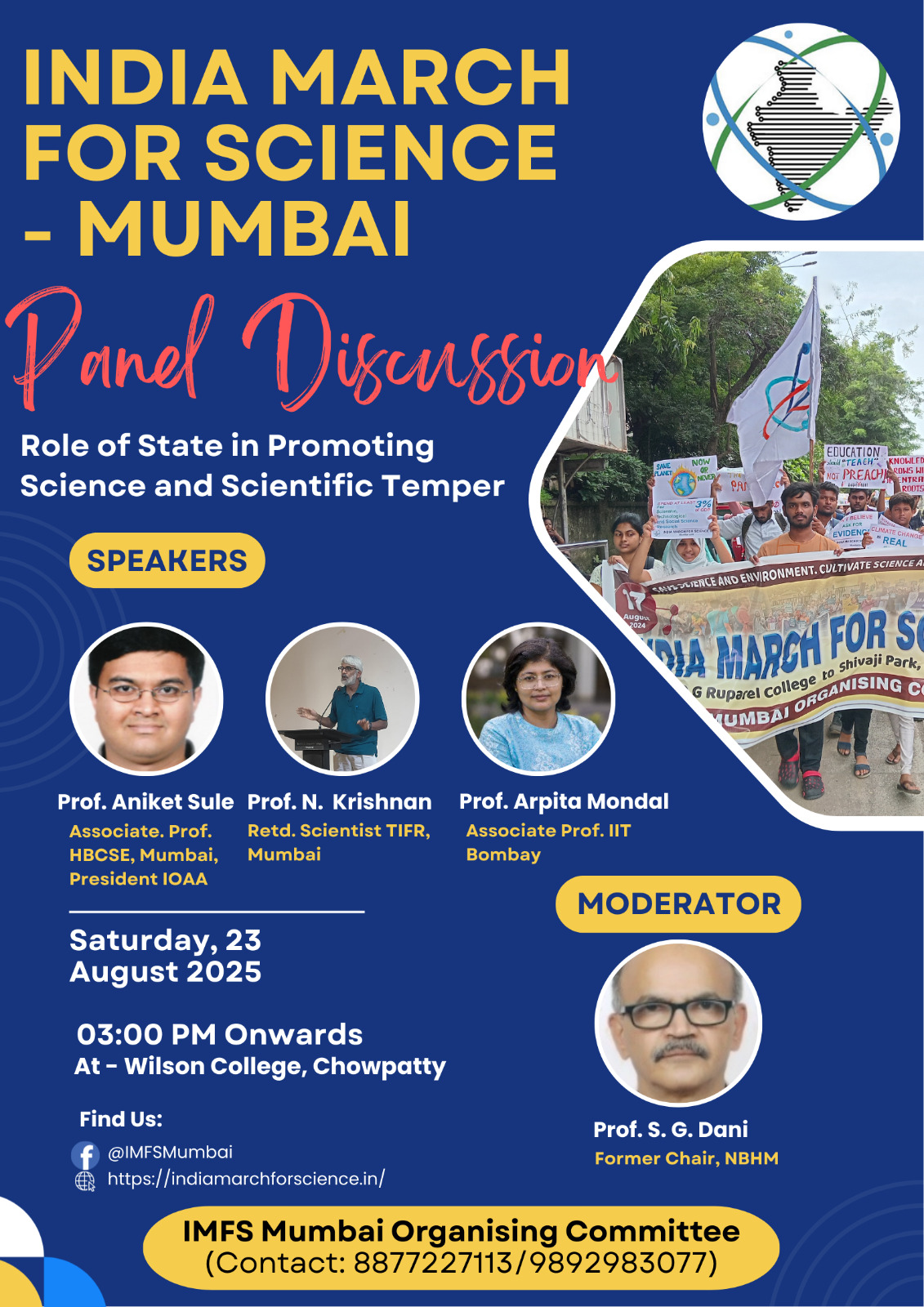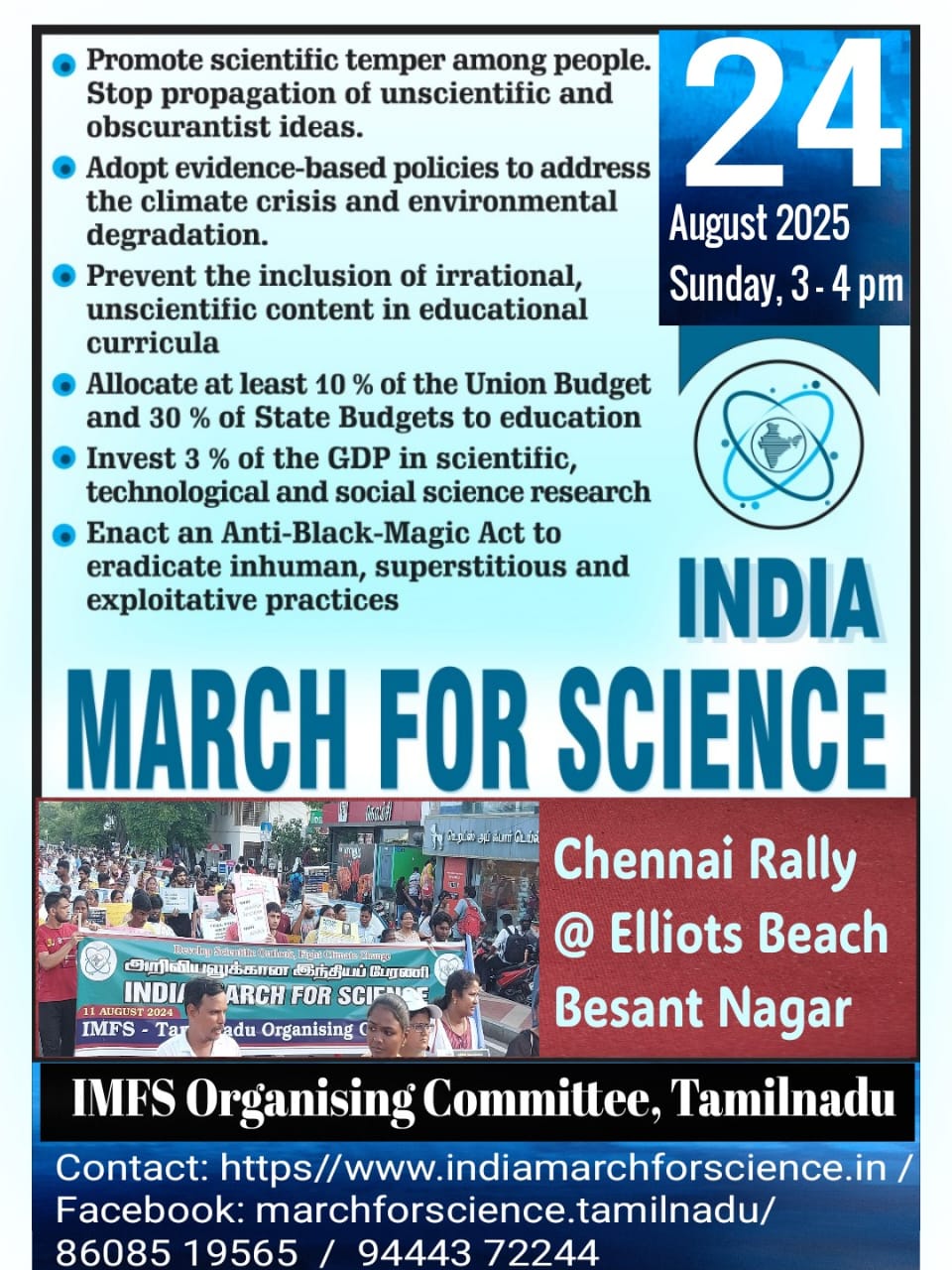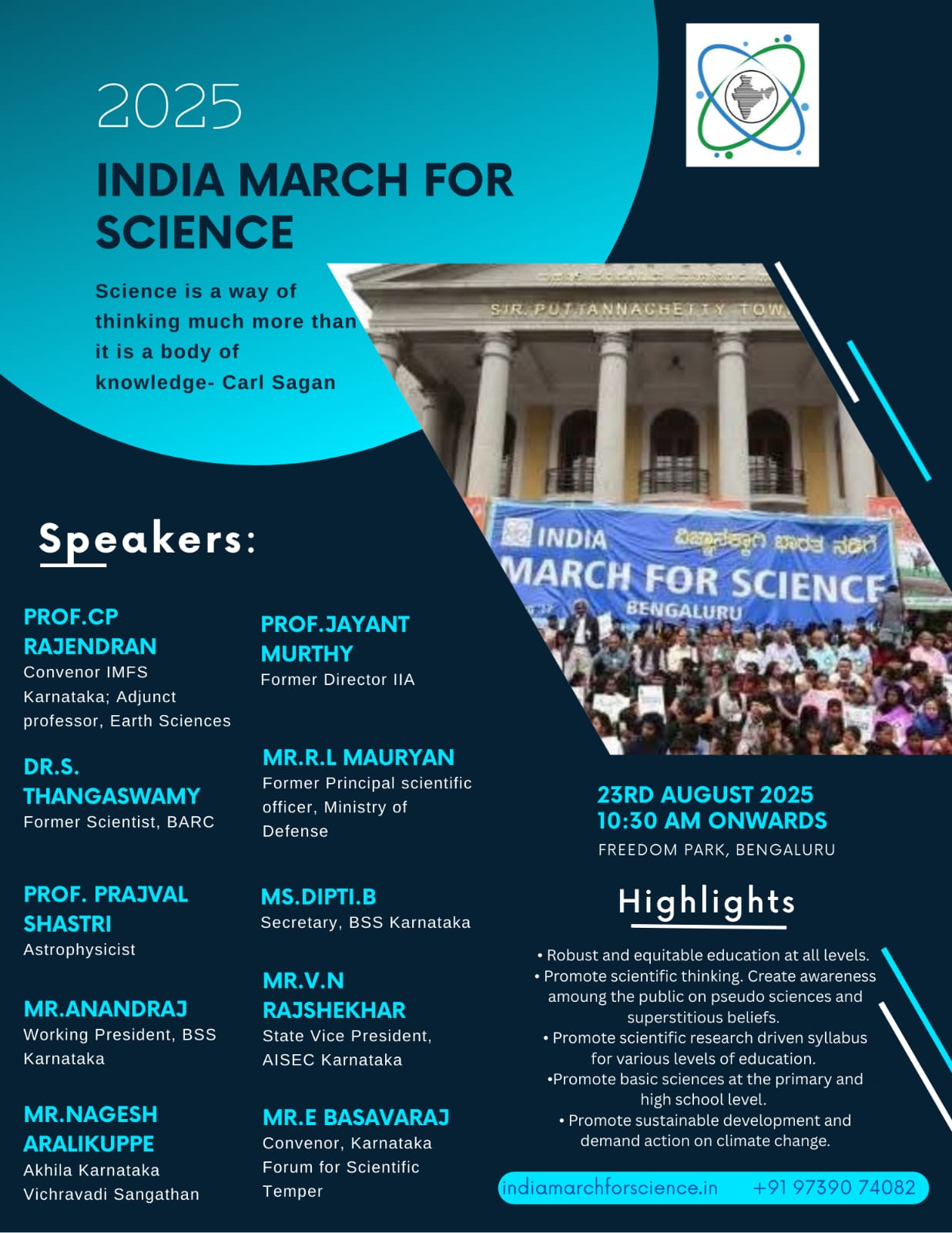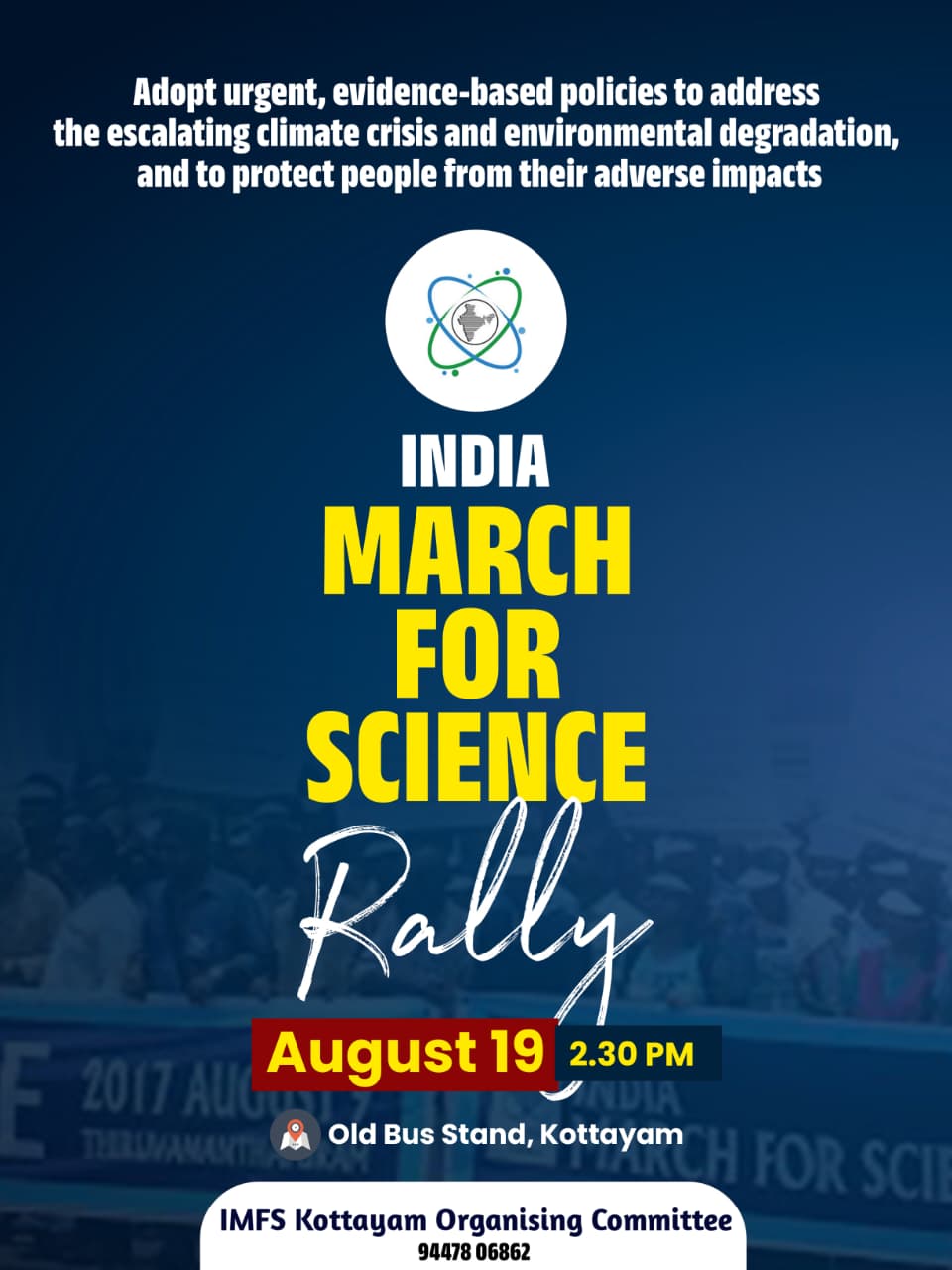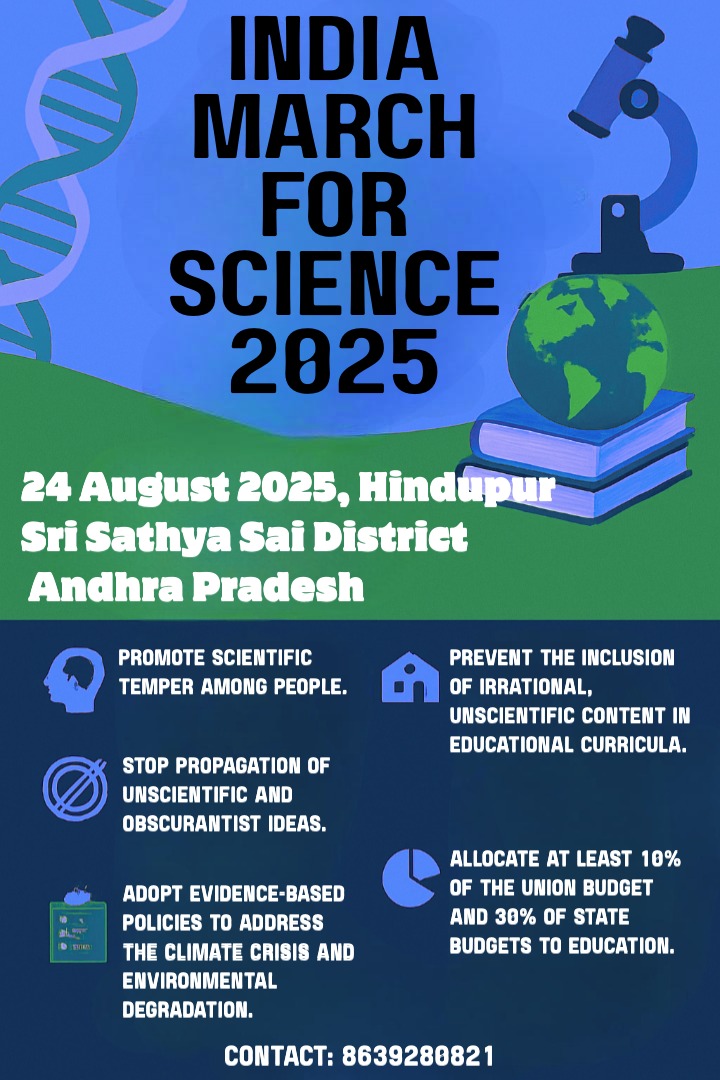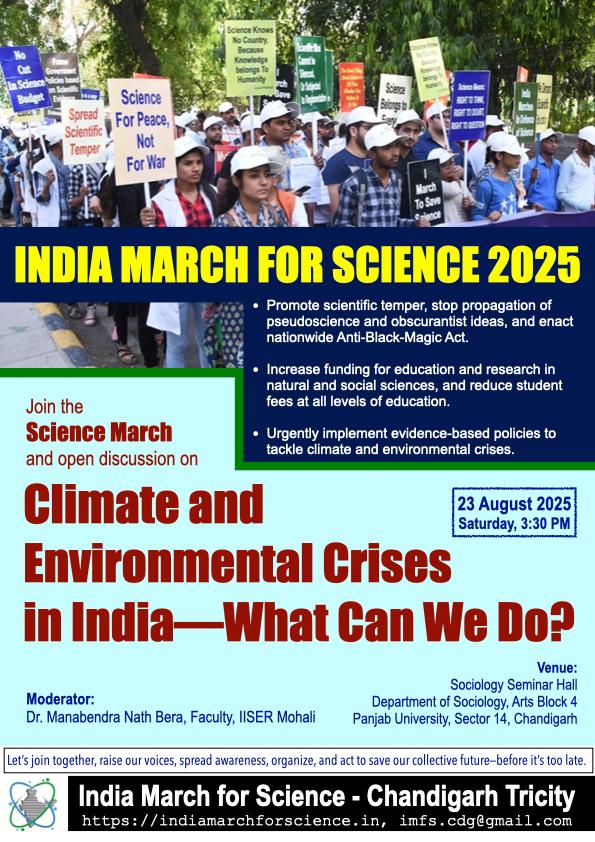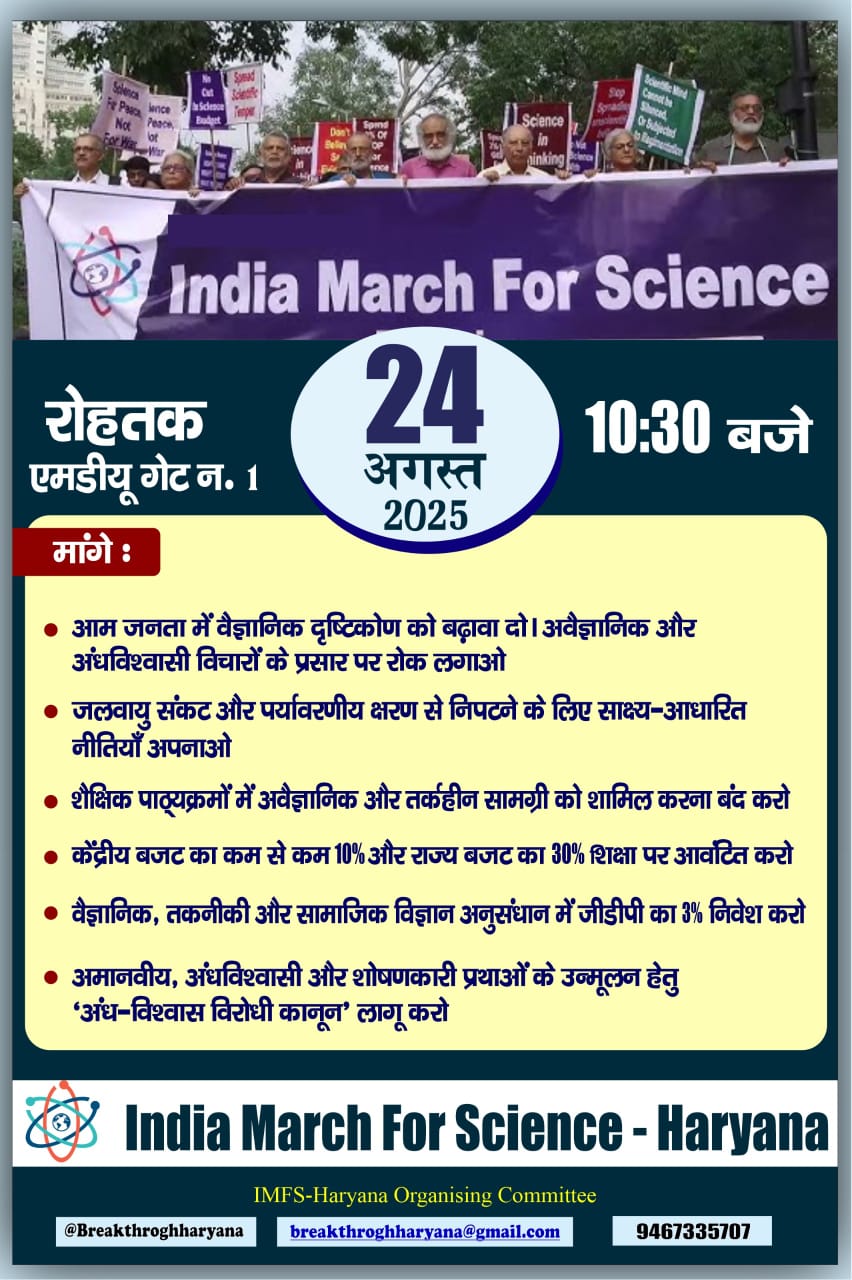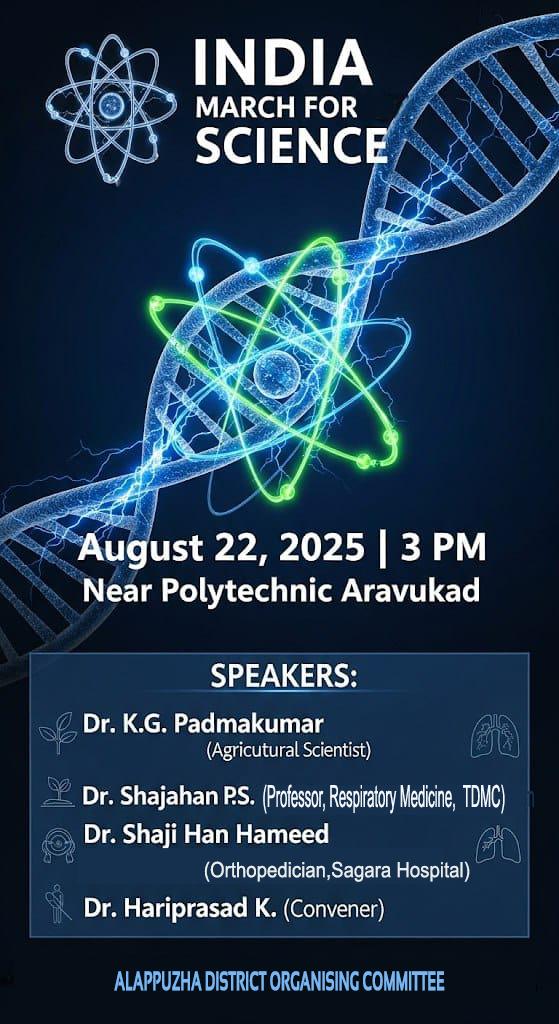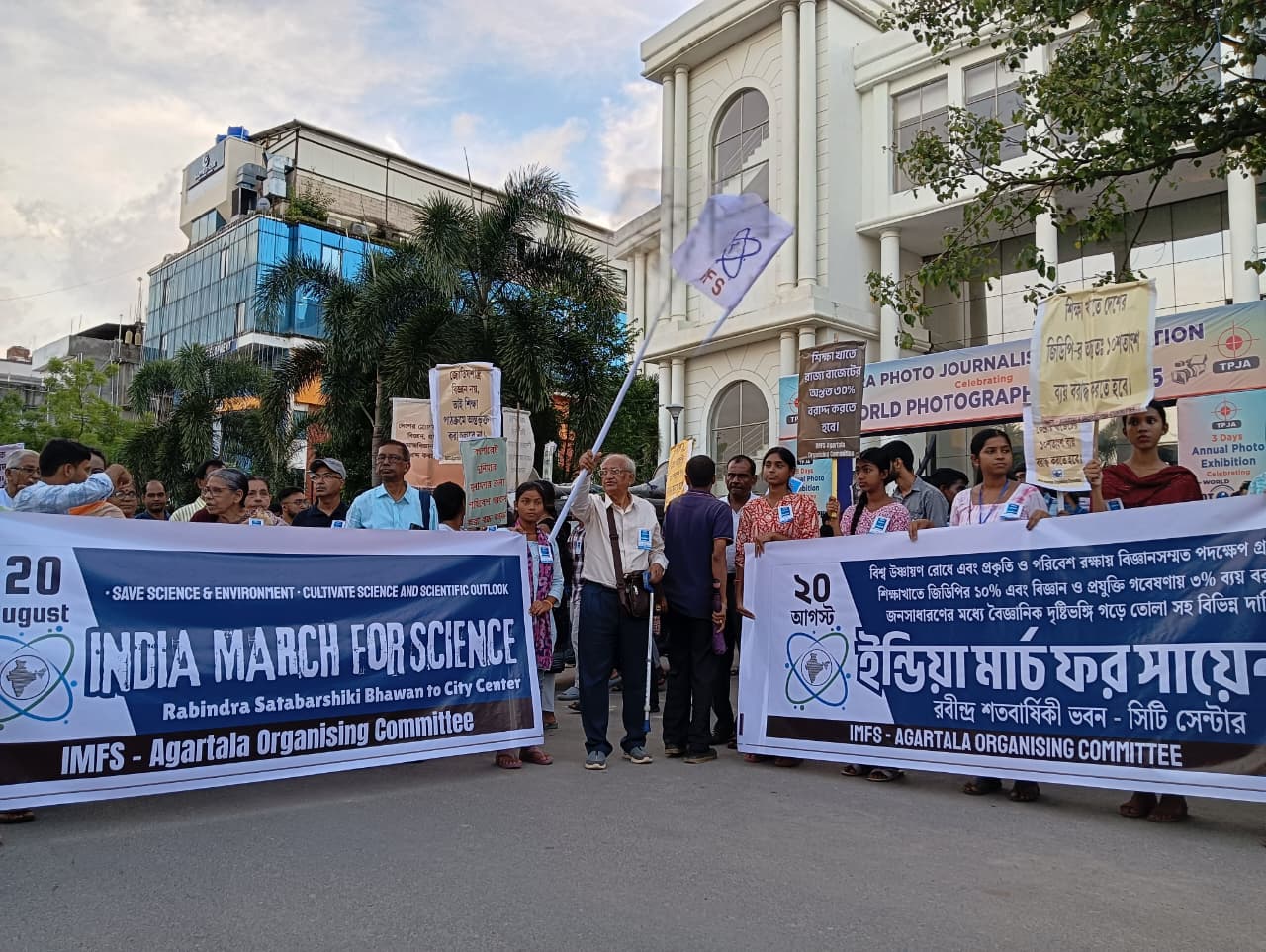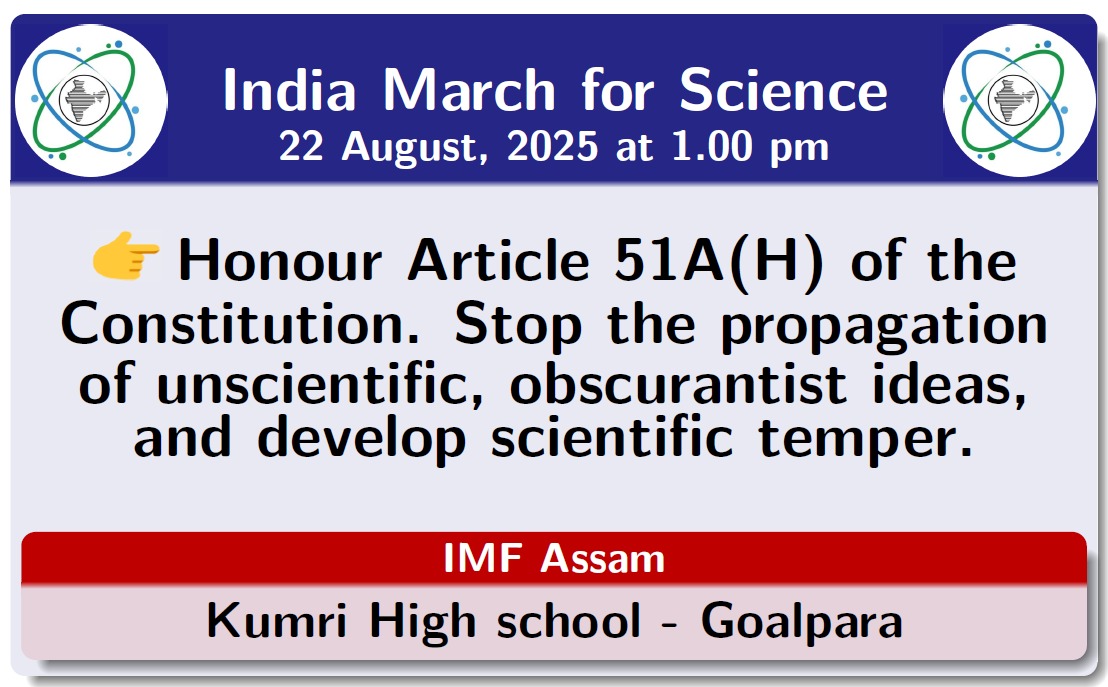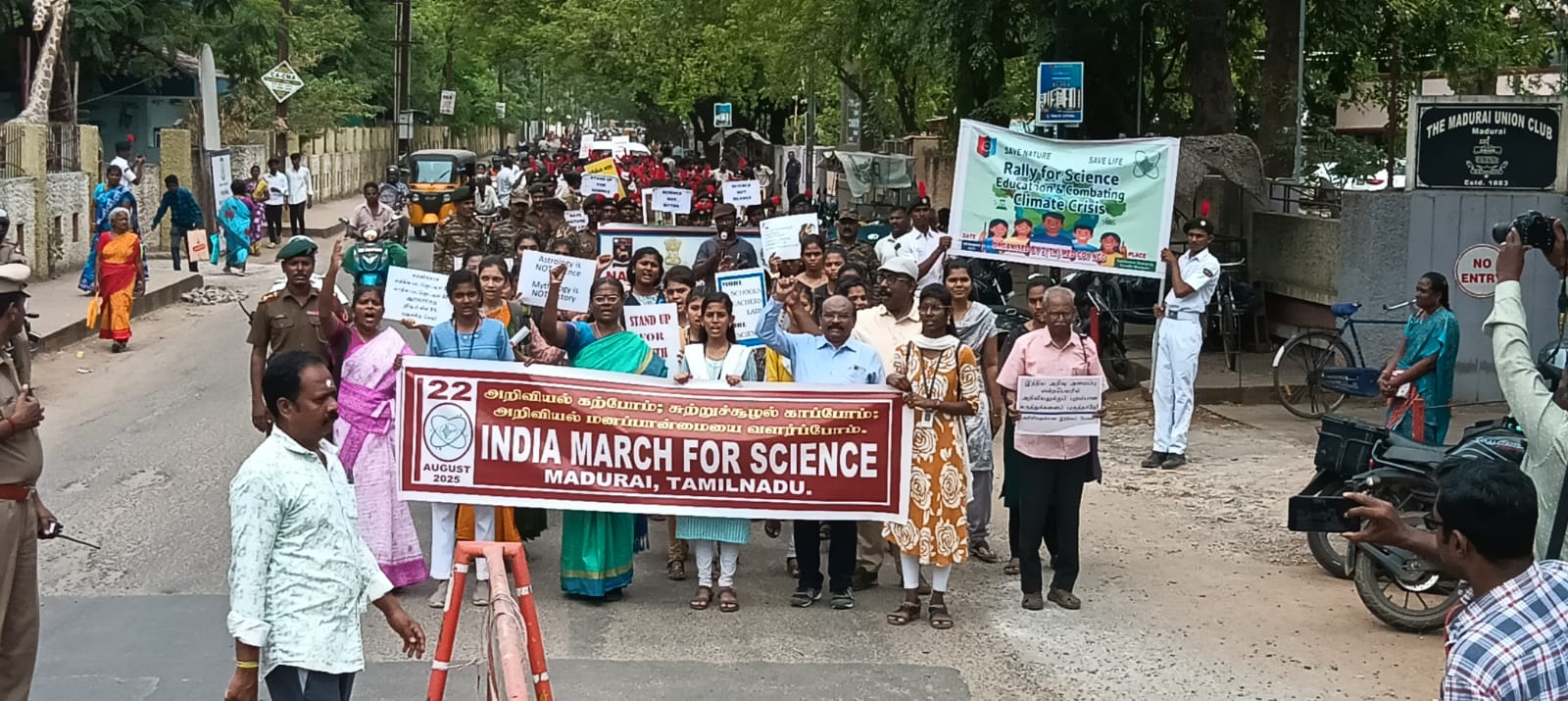INDIA MARCH FOR SCIENCE – 2025
India March for Science 2025
An Appeal
Even as science and technology continue to advance at an unprecedented pace, scientists around the world are sounding the alarm: science itself is under growing attack. Anti-science rhetoric is gaining ground, public trust is being eroded, and crucial research is being stifled by shrinking funding; funding diverted to using science for destructive purposes as in waging wars. Most troubling of all, governments are repeatedly ignoring scientific evidence—especially when it comes to protecting our planet—jeopardizing both our environment and our collective future.
In 2017, over a million scientists, educators, and supporters of science marched in nearly 600 cities across the globe to defend the role of science in society. In India, the ‘India March for Science’ has been organized in multiple cities since 2017. These marches protested the steady decline in government funding for education and scientific research, the implementation of policies that ignored scientific evidence, and the active promotion of unscientific ideas through official channels.
Global warming and climate change are no longer distant threats—they are a present and escalating reality. Extreme weather events, vanishing ice caps, rising sea levels, collapsing ecosystems, and accelerating mass extinctions bear stark witness to this crisis. Yet, beyond summit meetings, speeches, and panel discussions, meaningful action remains elusive. National leaders, it seems, are more focused on safeguarding short-term economic and corporate interests than confronting the urgent need to protect the planet and its future.
In India, we are witnessing widespread deforestation, alarming groundwater depletion, and the relentless pollution of rivers and water bodies. Vast tracts of forest land—such as those in Chhattisgarh and the Nicobar Islands—are being handed over to corporate interests under the guise of ‘development’. This unchecked exploitation of natural resources has led to a stark and shameful outcome: India ranked 176th out of 180 countries in the Environmental Performance Index 2024, a grim reflection of the environmental crisis we face.
While the remarkable achievements of science and technology in ancient India are a rightful source of inspiration, it is deeply concerning that unscientific and factually unfounded assertions are now being promoted as science by individuals in positions of power. This not only distorts our understanding of genuine scientific heritage but also fuels a combative chauvinism that stands in stark contrast to the spirit of true patriotism we uphold. Alarmingly, such claims are no longer confined to personal belief—they are being institutionalized through textbooks introduced under the banner of ‘Indian Knowledge Systems’ as part of the New Education Policy 2020.
In 2023, the centrally administered NCERT removed several key topics from the school curriculum—including Darwin’s theory of evolution, Mendeleev’s periodic table, the history of the Mughal era, and chapters on human rights and democracy. Despite widespread nationwide protests and strong criticism from the academic community, these essential subjects have yet to be reinstated.
Even in the 21st century, Indian society remains deeply entangled in superstition, allowing unscrupulous individuals to exploit vulnerable people through deceit and fear-mongering. Practices such as witch-hunting, human sacrifice, and exploitation in the name of faith healing and oracles continue to persist in various parts of the country. To effectively curb these inhumane and fraudulent acts, there is an urgent need for a comprehensive, nationwide Anti-Black-Magic Act.
India has long suffered from chronic underfunding in education and research. As a result, government schools are in a deplorable state—many lacking even basic science laboratories—while universities face severe shortages of infrastructure, faculty, and support staff. Since 1968, every national education policy has promised to allocate at least 6 % of the GDP to education. Yet, actual spending has remained below 3 %. Experts estimate that to meet this commitment, 10% of the Union budget and 30 % of state budgets would need to be dedicated to education.
Since the introduction of NEP 2020, education budgets have further declined—only 2.54 % of the Union budget was allocated in 2025. At the same time, funding for promoting ‘Indian Knowledge Systems’ has increased fivefold, raising concerns about misplaced priorities and a shift away from scientific, secular education.
While most developed and developing countries invest between 2.8 % and 3.5 % of their GDP in science and technology research, India allocates less than 0.8 %. This chronic underinvestment has left universities and research institutions grappling with severe funding shortages. The number of government-supported JRF (Junior Research Fellowship) and NPDF (National Postdoctoral Fellowship) positions falls far short of the actual demand, and NET or UGC fellows often face delays in receiving their stipends.
The sudden imposition of 18 % GST on scientific equipment has further jeopardized the smooth execution of research projects. Additionally, the centralization of research funding under the ANRF (Anusandhan National Research Foundation), along with the weakening or abolition of other key funding agencies, has made it increasingly difficult to secure support for fundamental research—except in a few selectively favoured areas.
In a time of deepening crisis—climate change, rising obscurantism, and shrinking research support—we call upon the scientific community and all science-loving citizens to rise in defense of science, reason, and education.
Defend Science, Defend the Future!
Join the India March for Science in your city to demand:
- Halt the propagation of unscientific and obscurantist ideas. Promote scientific temper in accordance with Article 51A(h) of the Constitution.
- Adopt urgent, evidence-based policies to address the escalating climate crisis and environmental degradation, and to protect people from their adverse impacts.
- Prevent the inclusion of irrational, unscientific content in educational curricula and ensure that education is firmly rooted in scientific evidence and critical thinking.
- Allocate at least 10 % of the Union Budget and 30 % of State Budgets to education, and significantly reduce student fees at all levels of public education.
- Invest a minimum of 3 % of the GDP in scientific, technological, and social science research to strengthen India’s knowledge economy.
- Enact a nationwide Anti-Black-Magic Act to eradicate inhuman, superstitious, and exploitative practices.
7. Exempt all research-related purchases from GST, and ensure timely and regular disbursement of scholarships and fellowships to research scholars.
Appeal by:
(Opinions held by the signatories are their own and do not necessarily reflect those of their Institutes.)
- Prof S G Dani, former Professor, TIFR and former President of the National Board for Higher Mathematics
- Prof. Dhrubajyoti Mukherjee, President, Breakthrough Science Society
- Prof C P Rajendran, National Institute of Advanced Studies, Bengaluru
- Prof. Soumitro Banerjee, IISER Kolkata & General Secretary, Breakthrough Science Society.
- Prof C P Aravindakshan, Science activist and science writer, President, Breakthrough Science Society, Kerala Chapter
- Prof Kurien Issac, former Professor, IIT Bombay and IIST Thiruvananthapuram
India March for Science 2025: Events
To see the report of each March with photos, click on the image of the corresponding poster
IMFS MOVEMENT
India March for Science is an integral part of the global March for Science
Science and scientific temper are the pillars on which the material development, prosperity, and cultural well-being of the Indian people rest.
‘India March for Science’, as an integral part of the global March for Science is an earnest endeavor to celebrate science to underscore the importance of cultivating scientific temper, and also to resist the attempts to propagate superstitious beliefs.
Contact Us
Please fill in the form. We will contact you soon.
8A Creek Lane
Calcutta – 700014
9433369069, 9433944608
contact@indiamarchforscience.in
